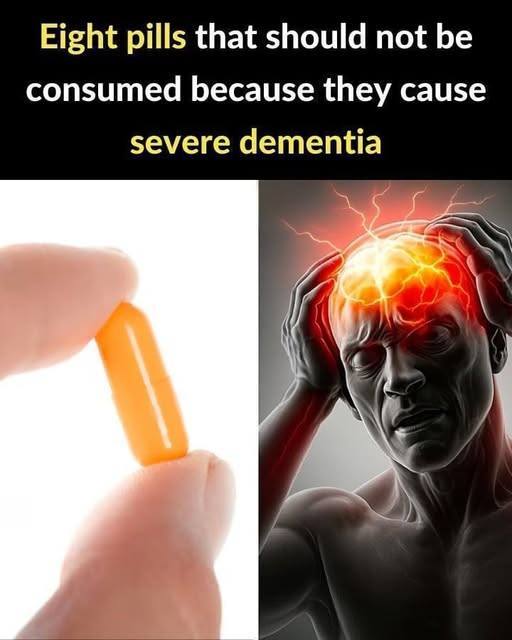Memory loss is not just a normal part of aging.
While forgetfulness can happen as we get older, serious cognitive decline and dementia may be fueled by medications you’re taking every day—without even knowing the risk.
A growing body of scientific research reveals that certain commonly prescribed drugs are linked to an increased risk of dementia, Alzheimer’s disease, and long-term brain damage. The scariest part? Many of these medications are taken for years, often without proper monitoring or awareness of their neurological side effects.
If you or a loved one is on any long-term medication, it’s critical to understand which drugs could be silently harming your mind—and what safer alternatives exist.
Here are 8 drugs scientifically linked to serious dementia risk, backed by medical studies and expert warnings.
🧠 1. Omeprazole & Other Proton Pump Inhibitors (PPIs)
Commonly used for: Heartburn, acid reflux, GERD
Drugs like omeprazole, esomeprazole, pantoprazole, and lansoprazole reduce stomach acid—but prolonged use (over 3–6 months) has been tied to a 44% higher risk of dementia in multiple studies.
🔍 Why it’s dangerous:
- Reduces absorption of vitamin B12, essential for nerve function
- Alters gut microbiome, which communicates with the brain
- Accumulates in the brain over time
📌 A 2016 study in JAMA Neurology found regular PPI users had a significantly higher risk of Alzheimer’s.
🛑 Safer alternative: Lifestyle changes (diet, weight, sleep), antacids (short-term), or H2 blockers like famotidine.
🧠 2. Diphenhydramine (Benadryl) & First-Generation Antihistamines
Commonly used for: Allergies, sleep aids, cold symptoms
Found in OTC products like Tylenol PM, Advil PM, and Unisom, diphenhydramine is a strong anticholinergic—a class of drugs that block acetylcholine, a key brain chemical for memory and learning.
🔍 Why it’s dangerous:
- Long-term use linked to 54% increased risk of dementia (University of Washington study)
- Impairs short-term memory, focus, and reaction time
- Effects can persist even after stopping the drug
🛑 Safer alternative: Second-gen antihistamines like loratadine (Claritin) or cetirizine (Zyrtec), which don’t cross the blood-brain barrier as easily.
🧠 3. Oxybutynin & Other Bladder Control Medications
Commonly used for: Overactive bladder, urinary incontinence
Drugs like oxybutynin (Ditropan), tolterodine (Detrol), and solifenacin (Vesicare) are potent anticholinergics.
🔍 Why it’s dangerous:
- Blocks acetylcholine in the brain, impairing cognition
- Linked to confusion, brain fog, and long-term memory decline
- Risk increases with age and duration of use
🛑 Safer alternative: Pelvic floor therapy, bladder training, or non-anticholinergic options like mirabegron (Myrbetriq).
🧠 4. Benzodiazepines (Alprazolam, Diazepam, Lorazepam)
Commonly used for: Anxiety, panic attacks, insomnia
Medications like Xanax, Valium, and Ativan are highly effective short-term but dangerous when used long-term.
🔍 Why it’s dangerous:
- Increases risk of Alzheimer’s by up to 51% with use over 6 months (Canadian study)
- Causes sedation, memory gaps, and dependence
- Withdrawal can cause seizures and worsen anxiety
🛑 Safer alternative: Cognitive behavioral therapy (CBT), SSRIs for anxiety, or melatonin for sleep.
🧠 5. Scopolamine
Commonly used for: Motion sickness, nausea, post-op recovery
Often given as a patch behind the ear, scopolamine is one of the most powerful anticholinergics.
🔍 Why it’s dangerous:
- Can cause immediate confusion, hallucinations, and delirium
- Even short-term use affects memory in older adults
- High risk for elderly patients undergoing surgery
🛑 Safer alternative: Ginger supplements, acupressure bands, or low-dose meclizine (with caution).
🧠 6. Meclizine (Antivert, Bonine)
Commonly used for: Vertigo, dizziness, motion sickness
Though marketed as safe, meclizine is another anticholinergic drug with hidden risks.
🔍 Why it’s dangerous:
- Crosses into the brain and disrupts memory circuits
- Linked to brain fog and increased fall risk in seniors
- Cumulative effect with other anticholinergics
🛑 Safer alternative: Vestibular rehabilitation therapy or natural remedies like ginger.
🧠 7. Corticosteroids (Prednisone, Methylprednisolone)
Commonly used for: Inflammation, asthma, autoimmune diseases
Long-term oral steroid use doesn’t just weaken bones—it harms the brain.
🔍 Why it’s dangerous:
- Disrupts cortisol balance, damaging the hippocampus (memory center)
- Linked to mood swings, depression, and cognitive decline
- British study: Long-term users have higher dementia rates
🛑 Safer alternative: Targeted anti-inflammatories, lifestyle management, or biologic therapies when possible.
🧠 8. Certain Antidepressants (Tricyclics & Some SSRIs)
Commonly used for: Depression, nerve pain, migraines
While many antidepressants are safe, tricyclic antidepressants (TCAs) like amitriptyline, nortriptyline, and doxepin are strong anticholinergics.
🔍 Why it’s dangerous:
- TCAs block acetylcholine, increasing dementia risk
- Doxepin (Silenor), used for sleep, is especially risky
- Even some SSRIs may affect cognition in vulnerable individuals
🛑 Safer alternative: Newer SSRIs/SNRIs with low anticholinergic activity (e.g., sertraline, escitalopram), under medical supervision.
✅ How to Protect Yourself and Loved Ones
You don’t need to stop life-saving medications—but you should review them wisely:
- Audit your medicine cabinet – List all prescription and OTC drugs.
- Check the anticholinergic burden – Use tools like the Anticholinergic Cognitive Burden Scale.
- Talk to your doctor – Ask: “Is this still necessary? Are there safer alternatives?”
- Never stop cold turkey – Some drugs require gradual tapering.
- Prioritize non-drug solutions – Diet, exercise, sleep, and therapy can reduce reliance on meds.
❤️ Final Thought: Your Brain Deserves Protection
Medications save lives. But when they come at the cost of your mind, it’s time to re-evaluate.
The sad truth? Many people develop dementia-like symptoms—not from disease, but from drugs meant to help them.
But here’s the hopeful part:
👉 Much of this risk is reversible if caught early.
👉 Switching to safer alternatives can restore clarity.
👉 Awareness today can prevent crisis tomorrow.
So take action now.
Review your prescriptions.
Ask questions.
Speak up.
Because your memories, your thoughts, and your identity are worth protecting—more than ever.










